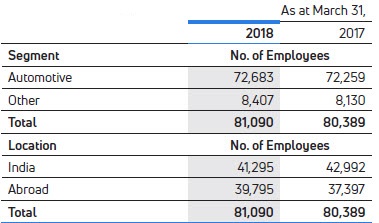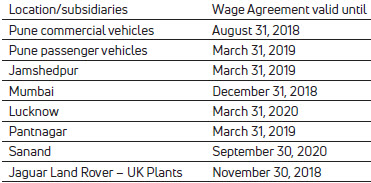HUMAN RESOURCES / INDUSTRIAL RELATIONS
The Company considers its human capital a critical factor to its success. Under the aegis of Tata Sons and the Tata Sons promoted entities, the Company has drawn up a comprehensive human resource strategy, which addresses key aspects of human resource development such as:
- The code of conduct and fair business practices;
- A fair and objective performance management system linked to the performance of the businesses which identifies and differentiates employees by performance level;
- Creation of a common pool of talented managers across Tata Sons and the Tata Sons promoted entities with a view to increasing their mobility through job rotation among the entities;
- Evolution of performance based compensation packages to attract and retain talent within Tata Sons and the Tata Sons promoted entities; and
- Development and delivery of comprehensive training programs to impact and improve industry- and/or functionspecific skills as well as managerial competence.
- In line with the Company human resource strategy, it has implemented various initiatives in order to build better organizational capabilities that the Company believe will enable it to sustain competitiveness in the global marketplace. The Company’s focus is to attract talent, retain the better and advance the best. Some of the initiatives to meet this objective include:
- Development of an agile organization through process modification, delayering and structure alignment and increase in customer facing roles;
- Changed organization structure has empowered teams, across each product lines, which will manage the product lifecycle and be accountable for the Profit and Loss;
- Extensive process mapping exercises to benchmark and align the human resource processes with global best practices;
- Outsource transactional activities to an in house back office (Global Delivery Center), thereby reducing cost and time of transaction;
- Talent management process redesigned with a stronger emphasis on identifying future leaders;
- Build strategic partnerships with educational institutions of repute to foster academia based research and provide avenues for employees to further their educational studies;
- Enhance company’s image and desirability amongst the target engineering and management schools, to enable it to attract the best;
- Functional academies setup for functional skills development;
- Skill development of all Blue collared workforce to enable them to effectively meet the productivity and quality deliverables.
- Training youth under Government of India’s National Employment Enhancement Mission in our skill development centers in all the plants. These trainees are given Automotive Skill Development Council certification, helping them get gainful employment in the industry. Engaging trainees benefit the company to meet the cyclicity of demand as well.
The Company employed approximately 81,090 and 80,389 permanent employees as at March 31, 2018 and 2017, respectively. The average number of flexible (temporary, trainee and contractual) employees for Fiscal 2018, was approximately 38,017 (including joint operations) compared to 38,120 in Fiscal 2017.
The following table set forth a breakdown of persons employed by the Company’s business segments and by geographic location as at March 31, 2018 and 2017.

Training and Development: The Company has committed to the development of its employees to strengthen their functional, managerial and leadership capabilities. The Company has a focused approach with the objective of addressing all capability gaps and preparing its employees to adopt to fast changing external environment in order to meet its strategic objectives.
To achieve this, the Company has established the Tata Motors Academy, which addresses development needs of various segments of its workforce through a structured approach. The Tata Motors Academy focuses on three functional pillars – customer excellence, product leadership, and operational excellence – and one pillar on management education, all of which are aligned with the Company-level strategic objectives. The emphasis of functional academies is to strengthen knowledge, skills and expertise with an in depth approach, within respective function, and the emphasis of management education is developing general management and leadership skills. Tata Motors Academy also provides executive education opportunities in the areas of B.Tech, M.Tech, Executive MBA.
As an integral part of the Tata Motors Academy, the Company’s Learning Advisory Council, which includes senior leaders from different parts of organization, aims to align its learning and development efforts, more closely with its business needs and priorities. The Learning Advisory Council is responsible for providing guidance and strategic direction to the Academies to design, implement and review the learning agenda.
The Company is now migrating from a trade-based training approach to a process-based training approach, which emphasizes team members’ knowledge as related to their actual work, in addition to the general trade-based skills, which are learned at training institutes. These skills are very specific and not currently taught at the training institutes. To accomplish this, the Companyis implementing a fundamental skills training initiative throughout organization. Its objective is to address key employee performance issues, such as inconsistent quality, poor craftsmanship, high frequencies of repair reworking and low productivity levels through training of front-line team members.
Union Wage Settlements: The Company has labour unions for operative grade employees at all its plant across India, except Dharwad plant. The Company has generally enjoyed cordial relations with its employees at its factories and offices and have received union support in the implementation of reforms that impact safety, quality, cost erosion and productivity improvements across all locations.
Employee wages are paid in accordance with wage agreements that have varying terms (typically three to five years) at different locations. The expiration dates of the wage agreements with respect to various locations/subsidiaries are as follows:

The Company’s wage agreements link an employee’s compensation to certain performance criteria that are based on various factors such as quality, productivity, operating profit and an individual’s performance and attendance. The Company has generally received union support in its implementation of reforms that impact quality, cost erosion and productivity improvements across all locations. In addition to this the Company have signed settlement with a variable as part of wage cost and stagger payment instead of one time pay to be bring more cost effectiveness on account of fixed pay.